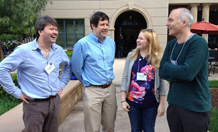
From left to right: Ian Bateman, Steve Polasky, Amy Binner and Brett Day.
Transatlantic link to help protect the environment
University of Exeter experts will collaborate with colleagues in the USA to work to protect our environment.
The transatlantic link with Stanford University and the University of Minnesota will allow the academics to combine their strengths to develop new ways of managing and investing in natural resources.
The experts will work with businesses, Government and other groups to develop a new generation of tools to help manage natural capital - assets such as soil, air, water and biodiversity - and the services it provides, including food production, clean water supplies and flood risk protection.
The work will be carried out by members of the newly-launched Land, Environment, Economics and Policy Institute (LEEP) at the University of Exeter. They will work with staff at the Natural Capital Project (NCP) at Stanford University in California and the University of Minnesota.
Academics in LEEP specialise in bringing cutting-edge economic research and tools to inform management, policy-making and implementation of the natural environment. Staff at the Natural Capital Project carry out world-renowned work to model natural capital systems, and have developed the internationally acclaimed Integrated Valuation of Ecosystem Services and Trade-offs (InVEST) model.
LEEP academics Professor Ian Bateman, Professor Brett Day and Dr Amy Binner met last week with Professor Gretchen Daily and Professor Steve Polasky, co-founders of the Natural Capital Project, to discuss the themes of the international research collaboration.
Professor Ian Bateman, Director of LEEP, said: “This is a wonderful opportunity for transatlantic, multi-disciplinary collaboration with the world leaders in modelling the environmental science of natural capital.”
Professor Brett Day, Director of LEEP, said: “We are working to build our research relationship with Stanford and are looking to work in areas where we can bring our strengths in economics and the strength of the Natural Capital project in natural science.
“We hope to develop methods and tools which will help governments and policymakers make decisions about how they protect the environment for the future.”
Whilst in the USA the three academics spoke at the 2016 Natural Capital Symposium to give an overview of LEEP’s aims and activities. This annual conference attracted nearly 300 people from 30 countries, who came to learn how natural capital information is transforming how people relate to nature, from the creation of green economies and water funds, to bringing nature back into cities. Dr Ben Wheeler from the University of Exeter presented findings that show sustained, long-term improvements in mental health including reduced anxiety and depression in people who move from concrete-dominated urban areas to greener urban areas with more trees.
The LEEP Institute aims to develop knowledge and understanding to inform governments, businesses and communities about how land and the environment are managed and used; the policies that affect this; the impact upon people, and how policy should be better designed, appraised and evaluated.
LEEP Academics are designing mechanisms for water companies to work with farmers to protect drinking water quality and showing governments where new trees can be planted to give the most benefit to society. They are also working to protect wildlife in Sumatra by developing ways in which land owners can improve their profitability and promote conservation and biodiversity. Other work examines how greenhouse gas could be reduced by farming more intensively but using less land.
Date: 1 April 2016
